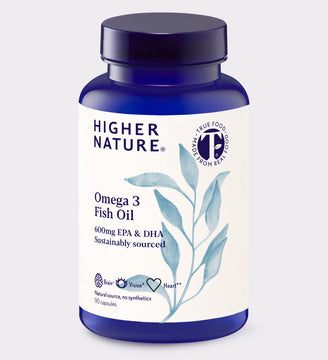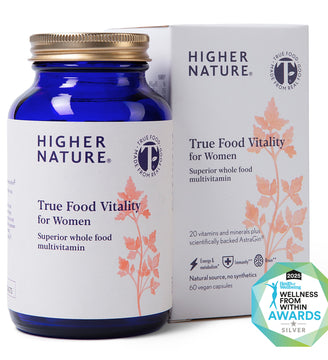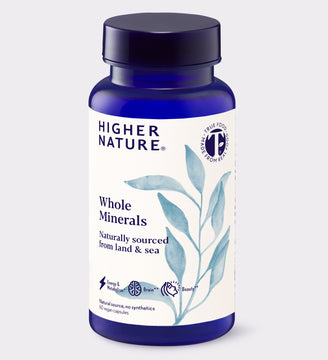
Heart health: what you need to know
Higher Nature Nutrition Team
Cardiovascular disease is responsible for around 160,000 deaths a year in the UK alone, and a further seven million people are living with the disease. It is an umbrella term that is used to describe a range of diseases that affect the heart and circulatory system. Cardiovascular disease, or CVD, includes strokes, heart failure, atrial fibrillation and cardiomyopathy.
Vital to life, your heart is an amazing pump which circulates blood containing oxygen and nutrients to all parts of the body via the vast network of surrounding arteries and vessels that form the rest of the circulatory system. There are many factors associated with an increased risk of CVD but the most common ones are:
High blood pressure
By far the most important risk factor for CVD, high blood pressure, or hypertension, often exists long before cholesterol deposits or hardening of the arteries are present. Increased blood pressure puts more strain on the heart, causes damaging changes to the vessels themselves, and ultimately increases the risk of strokes and heart attacks.
Smoking
Toxins in tobacco damage blood vessels, causing them to thicken and narrow, resulting in increased blood pressure.
Obesity
Metabolic changes occur as fat tissue accumulates in excessive amounts. Often alongside an increase in blood pressure, levels of triglycerides and cholesterol also increase. Glucose tolerance is impaired and levels of inflammation rise. Carrying excess body weight around the middle, or ‘central adiposity’, seems to present more of a risk.
Diabetes
Excess sugar in the blood can affect the walls of the blood vessels making them more prone to fatty deposits.
High cholesterol levels
Cholesterol is a fatty substance carried in the blood, bound to proteins. People often think of cholesterol in terms of ‘good’ and ‘bad’ but it is important to remember that it is essential for cell structure and hormone synthesis. The problem arises if LDL - ‘bad’ - cholesterol becomes deposited on the artery wall, forming plaques that both clog up and stiffen the arteries, raising blood pressure and increasing the chances of blood clot formation as bits break off.
Alcohol
Excessive alcohol consumption contributes to raised blood pressure and increases the risk of cardiomyopathy or the heart muscle weakening.
High homocysteine levels
Homocysteine is a naturally occurring amino acid which is produced by the body during a process known as methylation. Homocysteine levels in the body are usually low as it is rapidly metabolised, however this process relies on adequate levels of vitamins B6, B12 and folic acid. If these vital nutrients are depleted, homocysteine levels can build up and are thought to damage the walls of the blood vessels, causing rough spots where plaque can build up.
Lack of exercise
Those who exercise less are more likely to have higher blood pressure, higher cholesterol levels and be overweight.
Action plan for a healthy heart
The good news is that making simple dietary and lifestyle changes can pay dividends for your cardiovascular health.
In terms of diet, this means increasing your vegetable and fruit intake. These are rich sources of potassium, which helps maintain healthy blood pressure. Increase your fibre intake by incorporating plenty of wholegrains (oats, brown rice, wholemeal bread and pasta), pulses, nuts and seeds. Fibre is vital to ensure ‘spent’ cholesterol is eliminated from the system rather than being re-absorbed by the gut. Fibre also helps support healthy blood sugar levels and keeps you feeling full up, so avoiding the tendency to overeat and gain weight. Reduce your intake of sugary sweet foods and drinks which upset blood sugar control, increase triglycerides in the blood and have a damaging effect on the blood vessels.
Reducing your intake of saturated and trans-fats found in red meat, dairy products, fried and processed foods is also important to help keep cholesterol and triglyceride levels in check. Instead, boost your intake of omega 3 essential fats from oily fish, hemp seed, flax seed or walnuts. These vital fats help to keep blood pressure in the healthy range and also support healthy ratios of cholesterol.
Be mindful of your alcohol intake. Stick to the guidelines on unit consumption and aim to have two or three alcohol-free days each week.
Keep an eye too on your salt intake, as higher intakes of sodium can contribute to high blood pressure. Processed foods tend to be high, so keep these to a minimum.
Start taking regular exercise to help keep your blood pressure and your blood sugar levels in the healthy zone. Make it enjoyable so that it doesn’t seem too much of a chore – walk, swim, dance or perhaps join your local badminton or tennis club.
Give up smoking – not only will this be valuable for the cardiovascular system but also benefit your overall health.
Helpful heart nutrients
There are a number of nutrients that are supportive of the cardiovascular system.
Magnesium – this is thought to help blood vessels relax, thereby ensuring healthy blood pressure. Research also suggests it may help to decrease bad LDL cholesterol and increase good HDL cholesterol, helping maintain healthy cholesterol balance.
Arginine – this amino acid is needed to make nitric oxide, a substance that allows blood vessels to dilate helping support blood flow and healthy blood pressure.
Co-Enzyme Q10 – research shows CoQ10 to be useful for maintaining healthy blood pressure.
Fish oil – helps maintain healthy blood pressure and cholesterol levels.
Tri-methyl glycine (TMG) – in combination with vitamins B12, B6 and folic acid, TMG is required for healthy methylation – ensuring that homocysteine levels remain low.
Red yeast rice and plant sterols – help maintain healthy cholesterol levels.
Lysine – this amino acid in combination with vitamin C is thought to help maintain healthy blood vessels.


















